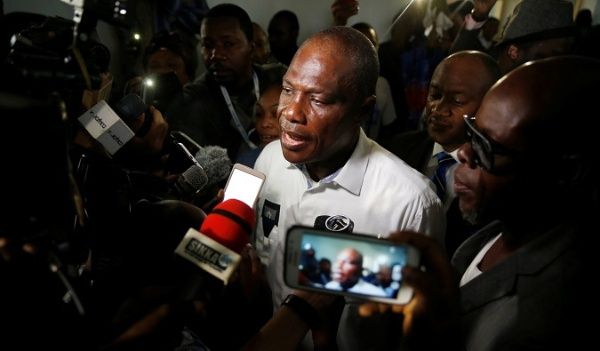Three opposition strongholds will see no casting of ballots at all after authorities canceled elections, citing health risks and ethnic violence.
Long queues, broken-down machines and torrential rain in the capital disrupted voting in the Democratic Republic of Congo's long-anticipated presidential poll Sunday.
RELATED:
Some polling places in the capital Kinshasa opened six hours after the official 6 a.m. start.
Three opposition strongholds will see no casting of ballots at all in Congo after authorities canceled elections there Wednesday, citing health risks from an ongoing Ebola outbreak and ethnic violence.
Elections are a rare event in Congo, which has been plagued by authoritarian rule, assassinations, coups and civil wars since independence from Belgium in 1960.
If President Joseph Kabila, in power since his father's assassination in 2001, steps down after the vote it will be the country’s first ever democratic transition.
Kabila voted early in the morning in the capital Kinshasa at the same school as the candidate he is backing, former interior minister Emmanuel Ramazani Shadary, whom the latest opinion polls showed trailing two opposition candidates.
Voters are also choosing representatives for the national and provincial assemblies.
The Catholic bishops conference (CENCO) said voting had not started on time at 830 polling stations, equivalent to about one-fifth of the stations across the country where it had deployed observers. It also said 846 polling stations were installed in "prohibited places" like military and police posts.
RELATED:
"Some (voters) do not even know how to use the voting machine," said Kayembe Mvita Dido, who was waiting in line at a polling station in the eastern city of Goma, in the shadows of the towering Nyiragongo volcano. He was referring to the new electronic voting system, criticized by the opposition as vulnerable to fraud.
Several machines broke down in Kinshasa, Goma, and Bukavu, bringing voting in some places to a halt, witnesses said. Some voters complained they could not find their names on the rolls, and flooded streets in Kinshasa prevented others from reaching their polling stations.
In the Kinshasa district of Limete, an opposition stronghold, voting had not begun in at least nine polling stations as of 12:30 p.m. because voting rolls had not arrived, a Reuters witness said.
Militia fighters in eastern Congo's Masisi territory were also reported around polling sites, where they were pressuring people to vote for their preferred candidates, a Western diplomat said.
"We have some issues and we are handling them all," electoral commission (CENI) spokesman Jean-Pierre Kalamba said on state television. "When a problem arises ... the solution won't be perfect ... We're choosing the lesser evil."
Despite repeated delays to the election, which was originally meant to take place in 2016, diplomats and poll observers have said authorities are ill-prepared, raising fears of a repeat of the violence that followed elections in 2006 and 2011.
Kabila's agreement to stick to constitutional term limits should represent progress for the mineral-rich central African country.
Critics, however, say they doubt the vote will be untarnished by fraud, and that Kabila could continue to rule from the sidelines. He has not ruled out running again for president in 2023.
Violent protests erupted this week after authorities announced that voting had been canceled in the Ebola-hit eastern cities of Beni and Butembo, their surrounding areas and the western city of Yumbi.
Together, they account for more than 1.2 million out of 40 million voters nationwide and are all considered opposition bastions.

After voting in Kinshasa, presidential candidate Martin Fayulu, a former Exxon Manager, said: "Today, we mark the end of Mr. Kabila, the end of the misery of the Congolese people."
But Shadary has big institutional advantages, including round-the-clock coverage on state media.
"I think victory is on my side and that tonight I will be president," Shadary said after casting his ballot.
The CENI has tried to reassure the opposition about the voting machines by saying that only print-outs from the machines counted by hand will be factored into the official results.
But any disputed outcome could lead to a wider security breakdown across Congo, particularly along its eastern borders with Rwanda, Uganda, and Burundi, where armed militia are active.
The last polls close at 5 p.m. (local time), although voting will continue for those still in line.